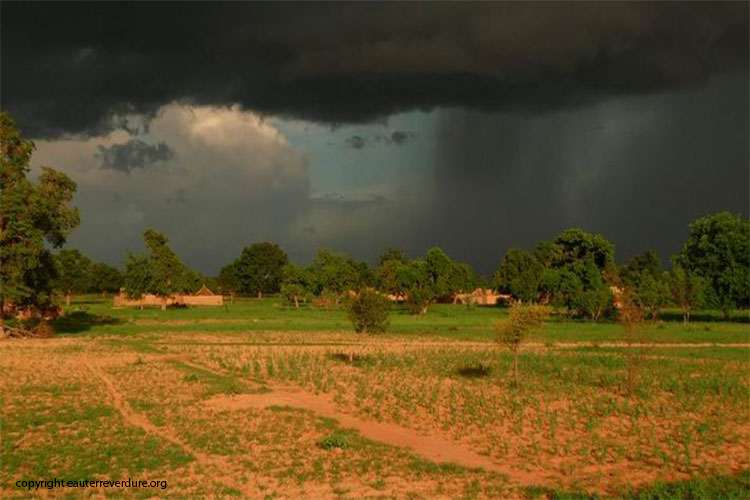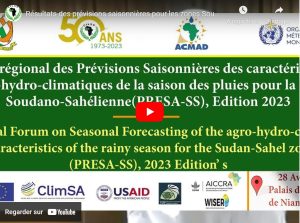Niamey, Apr 30, 2021 – Experts from the AGRHYMET regional center, ACMAD and the states, gathered for four days (from 26 to 30), around a forum on seasonal forecasts of agro-hydro-climatic characteristics for the Sudano-Sahelian zones (PRESASS 2021), have just delivered their results.
This second edition was held in virtual form due to the Covid 19 pandemic, said the forum’s organizers. These forecasts concern all 17 CILSS/ECOWAS countries.
For four days, our national, regional and international experts worked together to produce consensual, high-quality forecasts for the characteristics of the 2020-2021 rainy season in the CILSS/ECOWAS countries. They spared no effort to achieve these favourable results”, said Souleymane Ouedraogo, General Manager of the AGRHYMET Regional Centre, congratulating the participants.
Madame Alima Ouattara, lead partner, praised “the work accomplished by the experts from the various organizations under special conditions”.
As for Max Milem of the World Meteorological Organization (WMO), he welcomed the “privilege” of having participated in the first forum organized in Côte d’Ivoire in 1998, before noting “the progress made” since then.
According to him, “two WMO initiatives that are relevant to PRESASS and other regional forums”.
The first is the transition to operational systems for objective seasonal forecasts, following the decision taken by the WMO’s 72nd Executive Session.
These forecasting systems imply greater authorization for the exchange of climate data and products between the member countries of each sub-region, and between the regional and global centers that generate seasonal forecast products,” said Mr. Milem.
They also involve, he continued, the creation of multi-model ensembles that will ensure that forecasts provide the highest possible quality, thanks to cutting-edge science.
The second is to strengthen the operational implementation of adapted seasonal forecasting products that provide information on climatic variables of immediate use to users.
These variables can, for example, be used to forecast hydroelectric reservoir flows, soil moisture for agriculture, vegetation for livestock management, and temperature forecasts for the health sector, among others,” explained the director.
In this respect, he emphasized, “this diversity of products delivered by the national hydrological meteorological services will demonstrate considerably the usefulness of the information provided for decision-making in these areas”.
He went on to congratulate ACMAD and AGRHYMET, for their “leadership in the continued provision of seasonal climate information and also for the transition to the next generation of forecasting and adapted products”.
Bernard Koffi, representing the ECOWAS Commissioner for Agriculture, is delighted. For four days, you have provided food for thought on the main themes of this forum. We are already pleased with the flow of your work, which has resulted in the characteristic seasonal forecasts for the 2020-2021 rainy season in the Sahelian and Sudanese zones,” enthused Mr. Koffi.
In view of the above, he said, “ECOWAS congratulates CILSS and its technical arm AGRHYMET on these activities, and reaffirms its full support for the various activities that form part of the implementation of the ECOWAS meteorological program”.
We have also taken good note of the need for hydrological and meteorological services, to ensure the diversity of products delivered. In this sense, ECOWAS will spare no effort to provide the necessary support,” promised Bernard Koffi.
As proof, he argued, “the results of the hydromet forum and the meeting of the risk and disaster reduction platform held from April 21 to 22, 2021 in Banjul, which led to the adoption of three documents”.
These are the regional flood risk management strategy, the gender action plan for disaster risk reduction and the hydromet initiative.
What’s more, he added, “a meeting of partners during the forum enabled us to secure their commitment to mobilizing the resources needed to implement these strategies and initiatives”.
In this respect, said the Commissioner’s representative, “we are shortly planning to develop, with the support of the World Bank, a financing plan to support investment projects that will, among other things, strengthen collaboration with international and national institutions to obtain third-generation satellite data, equip meteorological and hydrological services, and build the capacities of our member states’ managers”.
ECOWAS is working in collaboration and partnership with international institutions and partners,” said Mr Koffi, who congratulated CILSS and its AGRHYMET technical center.
On the other hand, Dr Abdoulaye Mouhamadou, Executive Secretary of CILSS, called on “everyone to pay particular attention to issues linked to the impact of climate phenomena on the main sectors of activity, notably food security, water resource issues and natural disasters”.
The importance of seasonal climate forecasts is clear in a context where climate variability and change are major challenges for the sustainable development of our sub-region,” said Mr Mouhamadou.
In recent years, this has led to an upsurge in extreme meteorological and hydrological phenomena, notably floods and droughts, as in the 2020 rainy season, when unprecedented floods hit Niger, Mali and Senegal, among other countries.
These phenomena,” he points out, “are the cause of significant damage to natural and socio-economic systems, sometimes resulting in loss of life, but also natural impacts such as flooding of cemeteries”.
By anticipating and proactively managing this situation, seasonal and climatic forecasts are an invaluable tool, enabling players in climate-sensitive sectors to make judicious choices in preparation for the rainy season.
From this point of view, noted DR Abdoulaye Mahamadou, the AGRHYMET Regional Center, in collaboration with its partners, has for several years been building the capacities of hydrological meteorological service executives in the countries of the region, to better characterize and forecast hydro-agro meteorological risks.
The results of this forum, led by experts from the AGRHYMET regional center and AMAD, will be passed on to national authorities and the international community.
For its part, he assured us, “CILSS will make every effort to ensure that these results reach the authorities of CILSS and ECOWAS member states, so that they can better plan their actions at national level.
The CILSS Executive Secretary also thanked our partners, notably the European Union (EU), the ADB and USAID for their constant support to CILSS.


